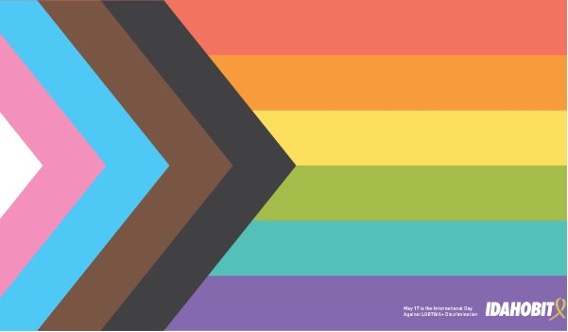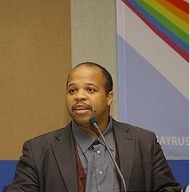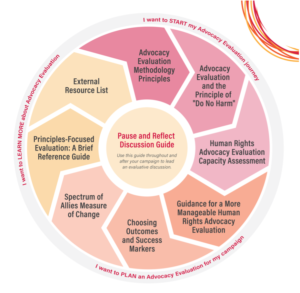
Editor’s Note
The focus in this month’s Bulletin is on the International Day Against Homophobia, Transphobia and Biphobia

Table of Contents
SPECIAL FOCUS: International Day Against Transphobia, Homophobia and Biphobia
SPECIAL SECTION
International Day Against Homophobia, Transphobia and Biphobia

International Day against Homophobia, Transphobia and Biphobia on May 17
The theme for this year is “Together always: united in diversity”. Decided during a large consultation with LGBTIQ organisations from across the world, the theme will allow for advocacy and celebrations in many forms – be them from human rights defenders, LGBTIQ civil society groups, millions of people in our communities, and our allies.
At a time when hard-won advances for our LGBTI communities around the globe are increasingly under threat, the power of solidarity, allyship and community across identities, borders, and movements has never been more necessary.
When we unite, in all our beautiful diversity, that’s when we can really bring about change!

The day, as a concept, was conceived in 2004. A year-long campaign culminated in the first International Day Against Homophobia on May 17, 2005. 24,000 individuals as well as organizations such as the International Lesbian and Gay Association (ILGA), the International Gay and Lesbian Human Rights Commission (IGLHRC), the World Congress of LGBT Jews, and the Coalition of African Lesbians signed an appeal to support the “IDAHO initiative”. Activities for the day took place in many countries, including the first LGBT events ever to take place in the Congo, China, and Bulgaria.
The date of May 17 was specifically chosen to commemorate the World Health Organization’s decision in 1990 to declassify homosexuality as a mental disorder.
Frenchman Louis-Georges Tin was founder of the day, and acted as its Committee Chairperson until his resignation in September 2013. He was succeeded by internationally renowned Venezuelan trans rights activist, lawyer and law professor Tamara Adrián, who became one of the first trans legislators in Latin America in 2015. Louis-Georges Tin and two other Committee members started a hunger-strike in June 2012 to urge the French president Hollande to introduce a UN resolution decriminalising homosexuality.
OHCHR and the human rights of LGBTI people
 Our office works to end discrimination and promote the human rights of LGBTI people by doing the following:
Our office works to end discrimination and promote the human rights of LGBTI people by doing the following:
- Raising concerns with Governments privately and putting forward recommendations for reform
- Monitoring and bringing to light human rights violations affecting LGBTI persons
- Engaging in public advocacy to decriminalize same-sex conduct and strengthen human rights protection for LGBTI persons through speeches and statements, fact sheets and distribution of various other materials
- Raising awareness about the human rights of LGBTI people through its UN Free & Equal campaign
- Working with the private sector for greater equality for LGBTI people
- Working with UN partners to counter discrimination and violence faced by LGBTI persons
- Providing support for the special procedures in the context of their fact-finding activities and confidential communications with Government
- Supporting the human rights treaty bodies that address discrimination linked to sexual orientation and gender identity; and that highlight steps that individual States should take in order to comply with their international treaty obligations in this respect
- Providing support for the Universal Periodic Review, which holds a forum for LGBTI persons to voice their concerns, and for recommendations to be developed based on these concerns
- Capacity-building and training to OHCHR field staff and the UN on issues and concerns that affect LGBTI people
GNPHR NEWS AND EVENTS
Psychology Organizations and Human Rights
The Network of Human Rights Groups in Psychology Associations is open to representatives of psychology associations that have established a committee, office, or subgroup focused on psychology and human rights. If you are interested in joining the group please register your interest here https://humanrightspsychology.org/home/about/interest-form-gnphr-working-group/
- Webinar Series Human Rights Education
 Human Rights and Forced Migration – Psychological Contributions. Brigitte Khoury & Julie Hakim-Larson, Date & Time, June 26, 2023 at 04:00 PM CET.
Human Rights and Forced Migration – Psychological Contributions. Brigitte Khoury & Julie Hakim-Larson, Date & Time, June 26, 2023 at 04:00 PM CET.
Register HERE
View all webinars in series here https://humanrightspsychology.org/webinarseries
Human Rights Award: Deadliue August 2023
International Council of Psychologists Human Rights Award
This award recognizes work being done by psychologists to advance human rights. The award is given to a psychologist or a group/organization largely composed of psychologists that has done substantial work to address human rights issues locally or globally through education, research, service or advocacy. Human rights are defined broadly and include social, cultural, economic, civil, and political rights. Deadline August, 2023.
CONTENT AREAS AND NEWS
General
Breaking news from the source. UN Web TV is the go-to site for all UN meetings & events, live and on-demand. webtv.un.org.
Protecting the Rights of People and Communities that are the Most Vulnerable. Cathryne L. Schmitz & Shirley Gatenio Gabel, Journal of Human Rights and Social Work, (7, 347–348), 2022, Springer, 19 November 2022.
While we all have responsibilities to respect human rights, governments have primary responsibilities to “promote, protect, respect and fulfill human rights” (International Service for Human Rights [ISHR], 2022, para. 7). Unfortunately, governments are often the very actors that violate, or fail to protect human rights. People who are most vulnerable in society are also the most vulnerable to human rights violations.
 Multiculturalism and Beyond: Reflecting on the Intersection of Intercultural Learning and Human Rights
Multiculturalism and Beyond: Reflecting on the Intersection of Intercultural Learning and Human Rights
Human Rights Educators
In this session, participants learn how to create impactful intercultural learning experiences to cultivate a culture of peace and human rights in their schools and communities. We explore examples of how intercultural learning is applied and its connection to human rights in both formal and informal education. This workshop seeks to create a brave and critical space for educators to learn, discuss, and unpack “isms” inside-outside schools. The goals of this workshop seek to: 1. Critically learn and reflect as educators on human rights, identity, power, and privilege. 2. Build a supportive and expansive network of educator-activists, human rights advocates, & student leaders. 3. Learn new frameworks to interrogate power, privilege, and positionality in formal and informal education. Learn more about this session and TAAS (Training As Action Series): https://hreusa.org/projects/training-…
A two-way traffic between psychology and human rights, Mayssah El Nayal and Mona G. Sayegh, February 2023, BAU Journal – Society, Culture and Human Behavior, Volume 4 Issue 2, February 2023.
The World Health Organization (WHO) defines health as a state of complete physical, mental and social well-being and not simply the absence of ailment or infirmity, and mental health as a state of well-being in which the individual is aware of his or her own abilities and is able to contribute to his or her community. On the other hand, the Universal Declaration of Human Rights (UDHR) declares that everyone has the right to a standard of living suitable for the health and well-being of himself and of his family. Therefore, mental health is a right and is protected by law. However, violations of human rights are abundant, causing a lot of drawbacks on different walks of life.
The twenty-first century is holding the legacy of its ancestor, the twentieth, and even speeding up to win the race to the unknown and wreaking havoc on whatever comes on its way in this outrageous competition. It has become a world full of logical fallacies, on which examples are abundant: oppression has become to be known as justice; verbal abuse as free expression; treason as normalization; tyranny as democracy; self-defense as terrorism; taboos as liberation; sexual perversions as legalized freedom, and so on. The list grows to comprise a countless number of examples for which there is no space to mention. But why? What is it that is causing such inconsistencies to be so abundant in the world? Are there no legislations to protect the human rights of the most vulnerable? What role is there for Psychology to play? Can the two realms, psychology and human rights, cooperate to give birth to a hybrid offspring of legislations that guarantees dignity and peace of mind?
Advocating for the Use of Restorative Justice Practices: Examining the Overlap between Restorative Justice and Behavior Analysis. Jeffrey M. Pavlacic, Karen Kate Kellum & Stefan E. Schulenberg, Behavior Analysis in Practice (2022) 15:1237–1246.
Broadly defined, restorative justice (RJ) is a set of procedures based in Indigenous peacemaking practices that reduces recidivism and guides the effective reparation of harm. RJ practices provide harm-affected parties an opportunity for engagement in the resolution process, which theoretically enhances community well-being. RJ practices overlap significantly with behavioranalytic principles. Implementing RJ practices from a context-focused, appetitive-based approach that focuses on classes of behaviors may address harmful behaviors within police organizations. RJ practices may also facilitate changes in contexts that support behaviors valued by the community. The current review discusses criminal and restorative justice, RJ processes and practices, the effectiveness of RJ in various contexts, how RJ overlaps with behavior-analytic principles and existing behavior science models in general, research suggestions, and recommendations for behaviour analysts implementing RJ within police organizations and communities to address officer misconduct.
Loreen, winner of the Eurovision Song Contest 2023 and Human Rights activist
During the Eurovision Song Contest 2012 in Baku, Azerbaijan, Loreen was the only entrant to meet local human rights activists. She later told reporters that “human rights are violated in Azerbaijan every day. One should not be silent about such things.”
In July 2012, Loreen performed in Belarus. During her visit to the country, she met with the wife of political prisoner Ales Bialiatski, Viasna representatives and independent journalists, and expressed her support of political prisoners and signed the petition to ban the death penalty in the country.
In August 2013, Loreen was the ambassador of the Swedish Committee for Afghanistan, and she visited Kabul, Afghanistan. The year after, the construction of a new primary school was due to start in the village and the plan was that Loreen would come back and follow the work of the new school until it was finished. “Education is the most important issue, when it comes to decrease poverty and to help people taking control over their own lives,” says Loreen.
For her work, Loreen was announced new patron of the World’s Children’s Prize in New York City, USA, and received the Crystal Globe. On 30 October 2014, she won the World’s Children’s Prize’s Crystal Globe for the second time and met with Nobel Peace Prize winner Malala Yousafzai in Sweden. She also supports the WCP—the world’s largest educational programs for children about children’s rights.
Academic Freedom / Higher Education
Climate Justice
The Lost Promise of Environmental Rights, Scott W. Stern, NY Review of Books, 15 March 2023.
The small community of Anmoore, West Virginia, sprang up out of the Appalachian wilderness in 1904 when an Ohio-based chemical company opened a manufacturing plant just outside the city of Clarksburg, and migrants seeking work settled nearby. They found jobs, but the work was filthy. By the late 1960s the chemical corporation Union Carbide had taken over the plant, and fly ash and particulate matter had settled on everything in town. “Bits of debris, some of it as large as butterfly wings, gather in drifts on Anmoore’s dead lawns,” recorded the essayist, novelist, and erstwhile speechwriter Charles McCarry. The pollution, laced with silica and lead, killed plants, blackened houses, ate the paint off cars, and infiltrated the lungs of the residents.
Crimes against humanity
‘Crimes against humanity’: UN body calls for release of Guantánamo inmate.
Julian Borger in Washington, 28 Apr 2023, The Guardian.
A UN body has declared that the detention of a long-term Guantánamo inmate, Abu Zubaydah, has no lawful basis and called for his immediate release, warning that the systemic deprivation of liberty at the camp may “constitute crimes against humanity”. The UN working group on arbitrary detention (UNWGAD), also declared the UK, among other countries, was “jointly responsible for the torture and cruel, inhuman or degrading treatment of Mr Zubaydah” over his more than 20 years in detention.
Red Cross Expresses Alarm Over Detainee Health at Guantánamo Bay. Carol Rosenberg, April 21, 2023, NY Times. As the prisoners age, their physical and mental health needs are increasingly challenging, the leader of a visiting delegation said. A senior official with the International Committee of the Red Cross issued a rare statement of alarm on Friday about deteriorating health conditions and inadequate preparations for aging prisoners at Guantánamo Bay.
Forensic Psychiatrist Calls Ex-C.I.A. Prisoner’s Confession Voluntary. Carol Rosenberg, April 20, 2023, NY Times. Prosecutors enlisted the full-time legal consultant to counter claims that a Saudi prisoner accused in the bombing of the destroyer Cole was in a state of “learned helplessness” at Guantánamo Bay. The psychiatrist, Dr. Michael Welner, was offering an expert opinion as a government consultant to counter arguments by defense lawyers that the prisoner, Abd al-Rahim al-Nashiri, 58, was conditioned to tell federal agents at Guantánamo Bay what they wanted to hear because he had been waterboarded, humiliated, threatened and kept in isolation for years.
Lawlessness Law, Verfassungsblog, 28 April 2023.
Years of inhuman treatment, and now, for the first time, a judgment.
The British House of Commons this week passed a bill of positively exquisite baseness. The Illegal Migration Bill, when it comes into force, will allow the British government to deport people fleeing from formerly colonised regions, who somehow make it to the territory of the arch-coloniser UK, to another formerly colonised region, without the European Court of Human Rights in Strasbourg being able to get in their way with interim injunctions. The UK is not allowed to do that, and they know it, but they do it anyway, not just because, but out of principle.
Decolonization / Indigenization
International Week of Solidarity with the Peoples of Non-Self-Governing Territories (May 25-31). The related Declaration urges the administering Powers concerned to take effective measures to safeguard and guarantee the inalienable rights of the peoples to their natural resources, including land, and to establish and maintain control over the future development of those resources.
Two key resources about UN efforts to promote decolonization include Ten Frequently Asked Questions and an infographic on the work of the UN Special Committee on Decolonization.
HREA‘s Online Resource Center contains resources for teaching about the rights of Indigenous peoples.
Sex, power and colonialism: ‘Marriages and sexuality were fundamental to colonial power’.
Myrthe Timmers, Universiteit Leiden, 5 April 2023
Sex and power are closely linked, and this was certainly true in the former Dutch colonies. PhD student Sophie Rose investigated how sexual and love relationships influenced eighteenth-century power structures there. ‘You can see that there was constant fighting over who stood where in the social hierarchy.’
When the VOC and WIC started travelling around the world in the seventeenth century, European women and families were initially sent along. They were supposed to form the basis of a new overseas empire that controlled all trade, but practice proved recalcitrant. ‘Especially in the VOC area (present-day Indonesia, ed.), they were not at all happy with the type of women who went there,’ says Rose. ‘Too often they came from the lower strata of society. At the same time, you find that the presence of women on board ships was seen as a risk. It was not unheard of for rape to occur, so eventually the VOC banned most European women from travelling to the region.’
Meanwhile, on the other side of the world, in present-day Suriname, roughly the same thing happened, the difference being that European women there often decided themselves that this kind of life was not for them. ‘To some extent, the WIC continued to encourage women to come, but many Europeans were not happy with the climate there. They got sick, and mortality rates were high. Many people decided to leave again almost as soon as they arrived.’
Disability Rights
PERSONAS CON DISCAPACIDAD [translation below]
Alejandro Santos Cid, EL PAÍS, 25 abril 2023.
México ha dado un paso de gigante en la lucha por los derechos de las personas con discapacidad. El Congreso de la Unión ha aprobado este lunes por unanimidad el Código Nacional de Procedimientos Civiles y Familiares (CNPCF). Compuesto por 1.191 artículos y 20 artículos transitorios, la nueva norma, entre otras cosas, deroga la interdicción, una figura legal que identifica como menores de edad a ojos de la justicia a las personas con discapacidad física o intelectual que no puedan valerse por sí mismas. La votación, considerada histórica por organizaciones civiles como Human Rights Watch, se ha saldado con 481 votos a favor, 0 votos en contra y 0 abstenciones, un consenso absoluto con pocos precedentes en la Cámara de Diputados mexicana.
PEOPLE WITH DISABILITIES
Alejandro Santos Cid, EL PAÍS, April 25, 2023.
Mexico has taken a giant step in the fight for the rights of people with disabilities. The Congress of the Union has unanimously approved this Monday the National Code of Civil and Family Procedures (CNPCF). Composed of 1,191 articles and 20 transitory articles, the new norm, among other things, repeals the interdiction, a legal figure that identifies people with physical or intellectual disabilities who cannot fend for themselves as minors in the eyes of the justice system. . The vote, considered historic by civil organizations such as Human Rights Watch, resulted in 481 votes in favor, 0 votes against, and 0 abstentions, an absolute consensus with few precedents in the Mexican Chamber of Deputies.
Inclusion, Exclusion, Racism
Asked to Delete References to Racism From Her Book, an Author Refused.
Alexandra Alter and Elizabeth A. Harris, NY Times, May 6, 2023.
The case, involving Scholastic, led to an outcry among authors and became an example of how the culture wars behind a surge in book banning in schools has reached publishers.
When Tokuda-Hall read the details of the offer, she felt deflated — then outraged. Scholastic wanted her to delete references to racism in America from her author’s note, in which she addresses readers directly. The decision was wrenching, Tokuda-Hall said, but she turned Scholastic down and went public, describing her predicament in a blog post and a Twitter post that drew more than five million views.
Windrush
On Monday June 22, Britain celebrates Windrush Day, honouring a generation of Caribbean immigrants who moved to the UK in the late 1940s at the invitation of the government.
In recent years though, the British government’s treatment of those individuals – known as the Windrush generation after the Empire Windrush passenger liner that brought some of them across the Atlantic – and their descendants has been the subject of a massive scandal.
Who are the Windrush generation?
The people who became known as the Windrush generation were invited to Britain to lay roads, drive buses, clean hospitals and nurse the sick, helping to rebuild the country after the devastation of World War II. They first arrived aboard the Empire Windrush in June 1948, landing at Tilbury Docks, about 20 miles from London. These voyagers – many of them from Jamaica – were the first large group of Caribbean migrants to arrive in the UK. They came to symbolize the seismic demographic changes in Britain that started after World War II and continued into the late 20th century, as hundreds of thousands of people arrived from former British colonies, known as the Commonwealth.
What was the scandal about?
The Windrush generation migrants arrived in Britain legally. Until a new immigration law came into force in 1973, Commonwealth citizens and their children had the automatic right to live and work in the UK. Many did so, without any need for additional documentation. In late 2017, however, a raft of cases were reported in which individuals who had arrived in the UK from Commonwealth countries before 1973, and sometimes their descendants, were struggling to prove their citizenship status under tough new immigration laws billed as a “hostile environment” policy. Many don’t have the required documentation because they had never been required to have it before. Some said they had been refused medical care, denied housing and deported or threatened with deportation.
LGBTQI+, Gender Rights
Russia, Homophobia and the Battle for ‘Traditional Values’.
Graeme Reid (Director, Lesbian, Gay, Bisexual, and Transgender Rights Program), 17 May 2023, Human Rights Watch.
December 2022, ten months into the full-scale military invasion of Ukraine, the Duma extended the scope of Russia’s ‘gay propaganda’ law forbidding the public portrayal of ‘non-traditional sexual relations’. Previously focused on minors, the prohibited exposure would now apply to any age group. Why would Russia’s parliament do this in the middle of a war? The amendment might appear to have been a trivial effort to distract the public from Russian military losses in Ukraine. But the restrictions, which render life precarious for LGBT+ individuals in Russia, have a much more ambitious purpose—to consolidate conservative support at home and position Russia as the defender of ‘traditional values’, in opposition to ‘the west’.
The ‘gay propaganda’ law has been at the heart of Russia’s domestic politics and foreign engagement—a symbol of its wholesale rejection of universal human rights. Its extension is but one further step in representing LGBT+ rights as a foreign threat and a Trojan-horse ‘enemy within’.
Russia: Putin’s Kremlin targets LGBT in new crackdown.
Will Vernon, BBC News, 23 January 2023.
A new anti-LGBT law was passed by the Russian Parliament in December. The new law bans “propaganda of non-traditional sexual relations” amongst all age groups. Anyone caught committing this “offence” could be fined up to 400,000 roubles ($5,840; £4,730), with much higher fines for organisations or journalists.
The bill began its journey through the Russian legislative system last summer, shortly after Moscow launched its so-called special military operation. The timing is no accident: Vladimir Putin says that Russia is not only fighting Ukraine on the battlefield, but also “Western” values. During a speech in the Kremlin to mark the illegal annexation of four Ukrainian regions, the president lashed out at the West and LGBT rights, calling them “pure Satanism”.
 Russia’s lower house of parliament has unanimously voted to extend its ban on so-called “gay propaganda”, 24 November 2022.
Russia’s lower house of parliament has unanimously voted to extend its ban on so-called “gay propaganda”, 24 November 2022.
Under the latest version of the law, any promotion of homosexuality – including in books, films and online – is illegal and carries heavy penalties. It was nicknamed the “Answer to Blinken” law, after the US Secretary of State Antony Blinken criticised it as a “blow to freedom of expression”. Activists say it is a further attempt to repress Russia’s LGBT community. On Wednesday, Anthony Blinken urged Russia to drop the bill “and respect the human rights and dignity of all.”
I am text block. Click edit button to change this text. Lorem ipsum dolor sit amet, consectetur adipiscing elit. Ut elit tellus, luctus nec ullamcorper mattis, pulvinar dapibus leo.
Mental Health and Human Rights
A two-way traffic between psychology and human rights.
Mayssah El Nayal and Mona G. Sayegh, February 2023, Society, Culture and Human Behaviour: Vol. 4: Iss. 2, Article 2. Open Access.
The World Health Organization (WHO) defines health as a state of complete physical, mental and social well-being and not simply the absence of ailment or infirmity, and mental health as a state of well-being in which the individual is aware of his or her own abilities and is able to contribute to his or her community. On the other hand, the Universal Declaration of Human Rights (UDHR) declares that everyone has the right to a standard of living suitable for the health and well-being of himself and of his family. Therefore, mental health is a right and is protected by law. However, violations of human rights are abundant, causing a lot of drawbacks on different walks of life. Besides, abuse in all of its forms is the backstage culprit in mental disorders and maladjustment with the society. For this reason, it should be counteracted by psychology, education and psychotherapy whose impact is magnified when protected by the power of law.
These facts triggered the authors’ interest to investigate how each domain, psychology and human rights, can contribute to maintaining mental wellbeing and protecting humans from discrimination. For this aim, the authors reviewed the literature and legislations and depended on field observation and personal experience and deduced that prominent benefits can be obtained when both domains cooperate together. Practical recommendations that can lead to tremendous progress on both the short and long terms are presented.
Mental Health and Human Rights Info (MHHRI). Newsletter No. 1, April 2023.
MHHRI provides information about mental health and human rights violations
Theme: How to improve mental health support for minorities in contexts of war, conflict, and migration?
WHO releases the largest global collection of health inequality data.
Geneva, 20 April 2023.
The data from the repository show that, in just a decade, the rich-poor gap in health service coverage among women, newborns and children in low- and middle-income countries has nearly halved. They also reveal that, in these countries, eliminating wealth-related inequality in under-five mortality could help save the lives of 1.8 million children. Read. the report here
Migration, Refugees, Displacement, Statelessness
Guaranteeing fair and equal treatment of migrant workers in the EU: The new Single Permit as a piece of the EU’s labour migration puzzle . Amy-Weatherburn, Human Rights Here, 26 April 2023.
The rationale for the Single Permit Directive was to offer third country nationals easy access to the European labour market by introducing a combined work and residence permit that would be granted through a single application procedure. Once employed in an EU member state, the Single Permit also guarantees the equal treatment by non-EU States with nationals of the Member State of residence, in areas such as working conditions, education and training, access to goods and services, and social security.
UK coastguard ‘left Channel migrants adrift’ in lead-up to mass drowning.
Aaron Walawalkar, Eleanor Rose and Mark Townsend, the Guardian, 29 April 2023.
Hundreds of vulnerable migrants were abandoned to their fates after the UK coastguard “effectively ignored” reports of small boats in distress during the days leading up to the worst Channel disaster in 30 years when at least 27 people died, an Observer investigation suggests. Around 440 people appear to have been left adrift after the coastguard sent no rescue vessels to 19 reported boats carrying migrants in UK waters, according to an analysis of internal records and marine data seen by the Observer and Liberty Investigates.
Experts said the failure to act appears to breach international law.
Women
Gendered discourses and pejorative language use: An analysis of YouTube comments on We should all be feminists.
Grace Diabah, University of Ghana, Legon, Discourse, Context & Media, Volume 51, February 2023.
Guided by Discourse and Ideology theory, this paper focuses on how authors of the YouTube comments on Chimamanda Adichie’s talk ‘We should all be feminists’ use pejoratives or insults to reinforce or challenge certain gender ideologies and practices. Since feminism is already a thorny issue, Chimamanda’s call for all to be feminists is seen as controversial and, thus, a recipe for inflammatory language use. Under the protection of social media
 Every five years since 1999, Equality Now has highlighted explicitly sex-discriminatory laws that need to be reformed in our Words & Deeds reports. As we approach 30 years since the adoption of the Beijing Platform for Action at the 4th World Conference on Women in 1995, we have produced a series of focused briefs that update on progress – this week, we published the fourth and last in that series, exploring the impact of sex discrimination in laws related to personal status and what still needs to change.
Every five years since 1999, Equality Now has highlighted explicitly sex-discriminatory laws that need to be reformed in our Words & Deeds reports. As we approach 30 years since the adoption of the Beijing Platform for Action at the 4th World Conference on Women in 1995, we have produced a series of focused briefs that update on progress – this week, we published the fourth and last in that series, exploring the impact of sex discrimination in laws related to personal status and what still needs to change.
Explore the full series of Words and Deeds:
– Sex Discrimination in Marital Status Law Sex Discrimination In Marital Status Laws
– Sex Discrimination in Violence Laws Sex Discrimination In Violence Laws
– Sex Discrimination in Economic Status Laws Sex Discrimination In Economic Status
– Sex Discrimination in Personal Status Laws Sex Discrimination In Personal Status
Ukraine
Pope Reveals He’s Working on Secret ‘Mission’ of Peace in Ukraine.
Jason Horowitz, NY Times, April 30, 2023.
Francis said he was doing “all that is humanly possible” to help return Ukrainian children taken to Russia and urged Hungary not to slam doors on migrants.
PUBLICATIONS
 Poverty, by America, Matthew Desmond, 21-03-2023, Penguin UK
Poverty, by America, Matthew Desmond, 21-03-2023, Penguin UK
Pulitzer Prize winning sociologist Matthew Desmond’s work on evictions in the United States opened our eyes to life’s daily horrors for many Americans living at or below the poverty line. Now, with his trademark blend of investigative journalism and academic rigor, Desmond turns to a much broader topic related to his previous work: poverty.
In his latest book Poverty, by America, Desmond encourages us all to be poverty abolitionists: to actively support and encourage policies, programs and mindsets that diminish poverty in the United States. This is no easy task, and requires updating not only government agencies and funding more equitable poverty-reduction programs, but more profoundly, begs us to take a long look in the mirror. Dollar for dollar, the American government gives the most help to those who need it least, with the most tax breaks and benefits going to the middle and upper class, while making the poor poorer. This, he says, is the true nature of our ‘welfare’ state.
Matthew Desmond is the Maurice P. During Professor of Sociology at Princeton University and founder of the Eviction Lab.
A Madman’s Will, John Randolph, April 2023, Liveright. Four Hundred Slaves and the Mirage of Freedom. The untold saga of John Randolph’s 383 slaves, freed in his much-contested will of 1821, finally comes to light.
OPPORTUNITIES
Exhibits, Events, Courses, Calls for Papers
 This once enslaved 17th century artist was misunderstood for centuries. A new exhibition rewrites his story.
This once enslaved 17th century artist was misunderstood for centuries. A new exhibition rewrites his story.
Jacqui Palumbo, Thu April 6, 2023, CNN
In 1650, the city of Rome was abuzz. The Spanish artist Diego Velázquez had just exhibited a portrait in the Pantheon’s domed interior. His subject: Juan de Pareja, an Andalusian man who was enslaved and serving as Velázquez’s studio assistant.
Pareja became an overnight celebrity. Soon after, he was freed from slavery and became an accomplished artist in his own right in Madrid. But he remains an elusive figure within art history, with details of his life prone to myth, his paintings often misattributed and no more than two of his works ever exhibited in the same place.
Call for inputs: Report on colonialism and sexual orientation and gender identity
Issued by Independent Expert on sexual orientation and gender identity
Deadline 26 May 2023
Purpose: Report to be presented to the 78th session of General Assembly in October 2023
The Independent Expert on protection against violence and discrimination based on sexual orientation and gender identity (IE SOGI), Mr. Victor Madrigal-Borloz, will dedicate his report to the 78th session of the United Nations General Assembly to the issue of the historic and ongoing impacts of colonialism on the enjoyment of human rights by lesbian, gay, bisexual, trans and gender diverse (LGBT) persons.
Call for Papers on the Effects of Race, Racism, Social Justice, and Health Equity in Child and Adolescent Psychiatry.
Proposal Deadline: June 1, 2023
JAACAP will publish a series of papers on the effects of race, racism, social justice, and health equity in child and adolescent psychiatry. These articles can cover the entire range of submissions within JAACAP including New Research, Reviews, Clinical Perspectives/ Translations, Commentaries, Attachments, and book reviews.
Proposals: Authors are invited to submit proposals for consideration in this special review series to the editorial office. A proposal should include: an abstract, initial outline, intended article type, and the full list of proposed authors so that early feedback and guidance can be provided prior to the development of a full manuscript. An invitation to submit does not guarantee acceptance of the manuscript. All papers should conform to the guidelines for reviews (see Guide for Authors) and will be subject to peer review. Please direct inquiries and proposals to support@jaacap.org.
CONTACTS: Published by the Global Network of Psychologists for Human Rights – www.humanrightspsychology.org
Disclaimer: The website of the Global Network of Psychologists for Human Rights (GNPHR) contains articles, events and news about the domain where psychology and human rights intersect. The information presented in this Bulletin, does not imply that the GNPHR shares the views and beliefs in the articles.
- @GNPHR1
- How to get involved – read how you can contribute to the global network
- Consider contributing a Blog/Commentary
- News and Bulletins from the GNPHR – Subscribe to GNPHR
- Email addresses:
Ways to Participate in Global Network Activities
- Student/young person representation on the GNPHR Steering Committee
Are you a student or young person (under 35 years of age) interested in joining the GNPHR Steering Committee? The GNPHR invites applications. Role description: The terms of reference broadly define the roles of all members of the steering group. Individual steering committee member tasks include : Each member will take responsibility for one of the following: (a) A specific content area or group of areas; (b) A specific project (e.g. survey of human rights reporting mechanisms; survey of educational programs in psychology/human rights, etc); (c) A specific function: for example, organizing a newsletter; soliciting commentary or newsletter blogs; seeking grant possibilities; outreach to general human rights organizations; outreach to psychology organizations or (d) Consultation: Working in collaboration with other organisations where there is a specific issue. In addition, from time-to-time, short-term subgroups may work on specific projects. In addition, for the student member, there would be a specific remit to liaise with other organisations that are focussed on younger people, psychology and human rights. Click here if you are interested in being nominated. - Share Your Experiences and Examples
One of the best ways to illustrate the intersection of psychology and human rights is through example. We are looking for examples of your encounters with human rights issues in your professional life. You might describe a time when you protected (or failed to protect) human rights, or advocated for what you saw as a human rights issue. The events might be in your clinical, research, academic, applied, or volunteer work. Please send your narrative / story (500-1000 words) to Marlena Plavšić (marlena_plavsic@hotmail.com). We will compile these for publication in the GNPHR Bulletin and on the website. Please also indicate if you would like your stories to remain anonymous. - Share your Expertise and Opinions
We invite you to contribute a blog or opinion piece on general human rights issues; human rights education or strategies for raising the profile of human rights within psychology or your professional life. Students are welcome to contribute, including on student needs for learning about and addressing human rights. Please contact the GNPHR Blog editor (blogeditor@humanrightspsychology.org) with ideas for the article you would like to write! - Send articles/news/events
If you come across a human rights article or news, or know of an upcoming hunman rights event, please send for publication in the Bulletin. Send to the Bulletin editor Polli Hagenaars (polli.hagenaars@gmail.com).

